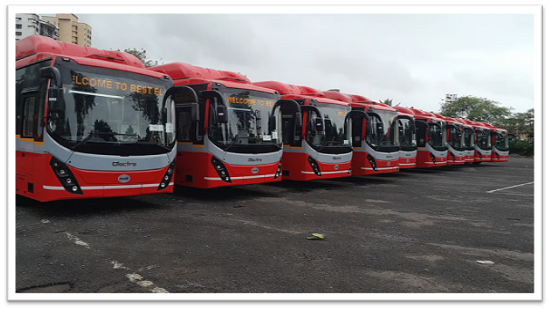
Mumbai Gets a Green Makeover! 157 New AC Electric Buses Hit the Roads, BEST’s Bold Move Toward a Cleaner Future
Mumbai’s public transport network just received a major boost in both comfort and sustainability. With the addition of 157 new air-conditioned electric buses, the Brihanmumbai Electric Supply and Transport (BEST) Undertaking has taken another decisive stride toward creating a cleaner, more efficient, and commuter-friendly city.
Launched under a wet lease system inaugurated by Chief Minister Devendra Fadnavis, the buses are operated by Mumbadevi Mobility and Evey Trans (Maharashtra) Pvt. Ltd. These 12-meter-long electric buses will run from the Oshiwara, Gorai, Anik, and Kurla depots, serving thousands of commuters daily. For a metropolis that relies on its buses as a lifeline, this expansion represents far more than a fleet increase — it’s a shift toward a new era of green urban mobility.
A Data-Driven Leap Toward Sustainability
The numbers highlight the significance of this transition. With the new additions, BEST’s total fleet now stands at 2,798 buses, making it one of India’s largest urban transport systems. The undertaking carries more than 30 lakh passengers daily, and the addition of these e-buses will directly improve service frequency and reduce waiting times across key routes.
Each electric bus helps eliminate up to 50 tonnes of carbon emissions annually compared to traditional diesel models. Taken together, the 157 new AC e-buses could reduce over 7,000 tonnes of CO₂ per year, a meaningful contribution to Mumbai’s environmental goals. This aligns perfectly with the city’s Climate Action Plan, which emphasizes low-emission public transport as a core sustainability target.
The electric transition also brings operational benefits. With lower fuel costs, reduced maintenance, and improved reliability, the shift is not just good for the planet — it’s smart economics.
Financial Sustainability Through Innovation
Chief Minister Fadnavis has urged BEST to diversify its revenue sources, targeting 40 percent of total income from non-fare avenues such as advertising, rentals, and public-private collaborations. This recommendation reflects a global best practice followed in successful transit systems in cities like Singapore, Seoul, and Hong Kong, where financial resilience goes hand-in-hand with service innovation.
Public transport thrives when it balances efficiency with sustainability. The introduction of these buses represents an attempt to make Mumbai’s mobility ecosystem both environmentally responsible and financially sustainable — a combination that can redefine the city’s transport future.
Expanding Routes, Expanding Reach
The newly added AC electric buses will operate on a diverse range of routes designed to connect residential hubs, business districts, and transit junctions more effectively. This includes both short local services and longer inter-zonal routes.
Some of the key new routes include:
• A-4: Oshiwara Depot to Dr M Iqbal Chowk (19.5 km)
• A-33: Goregaon Bus Station (W) to Worli Depot (21.8 km)
• A-156: Worli Depot to Vesave-Yari Road Bus Station (30.9 km)
• A-424: Mulund (W) to Goregaon Depot/Oshiwara Depot (25.1 km)
• A-425: Chhatrapati Shivaji Maharaj Talao to Vesave-Yari Road (37.6 km)
• A-313: Kurla Station (W) to Santacruz Station (E) (5.3 km)
• A-C10: Backbay Depot to Anik Depot (14.4 km)
These routes are designed to ensure greater last-mile connectivity, smoother suburban travel, and easier access to metro and railway networks.
Redefining the Commuter Experience
For commuters, the transformation will be immediately visible. The new buses offer air-conditioning, low-floor designs, comfortable seating, and real-time GPS tracking to improve reliability. They are also fully accessible for senior citizens and differently-abled passengers.
Beyond comfort, electric buses bring a sensory change to the urban experience — quieter rides, reduced vibration, and a noticeable improvement in air quality. BEST officials also emphasize that the electric models have lower breakdown rates, helping maintain schedule reliability, particularly during peak traffic hours.
The Broader Urban Transition
Mumbai’s shift toward e-mobility reflects a nationwide transition that connects technology, policy, and environmental responsibility. It is part of India’s commitment to achieving net zero emissions by 2070, and of the city’s ongoing push to modernize its infrastructure while maintaining inclusivity.
Initiatives like the Mumbai Metro expansion and coastal road project are complementary steps in this transformation, building a multi-modal ecosystem that integrates rail, metro, and electric bus networks. The impact extends far beyond convenience — shorter travel times boost productivity, while cleaner air improves public health and overall quality of life.
Challenges and the Road Ahead
While the new buses mark a strong beginning, long-term success will depend on sustained investment in charging infrastructure, grid stability, and workforce training. The wet lease model allows fleet expansion without high capital expenditure, but scaling up will require operational innovation and technological adaptation.
BEST’s focus on renewable charging stations, smart ticketing, and predictive maintenance can make it a benchmark for electric mobility in India. As electric fleets grow, these elements will ensure that efficiency keeps pace with ambition.
Toward a Greener, Smarter Mumbai
The introduction of 157 AC electric buses is more than a transport initiative — it’s a statement of intent. It represents the city’s willingness to evolve, innovate, and embrace sustainability as a cornerstone of progress. For a city as dynamic as Mumbai, where every minute and every commute matters, such investments deliver long-term dividends for both people and the planet.
In the next 18 months, if expansion continues at this pace, BEST could emerge as one of India’s largest all-electric urban bus operators. This transformation would mark a defining moment in Mumbai’s story — where the roar of diesel engines gives way to the quiet hum of electric progress.
Mumbai is not just moving forward; it’s moving smarter, cleaner, and faster — setting a precedent for cities across India.





